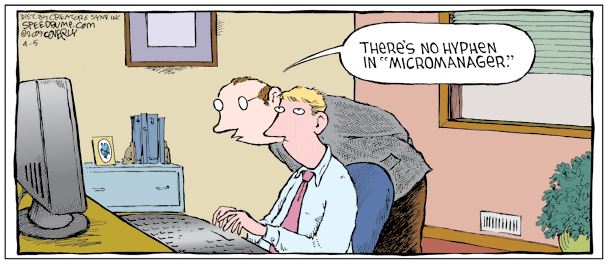Have you ever had a boss who wouldn’t leave your work alone? Who had to rewrite and approve everything you did, no matter how small? Who was never satisfied with anything, ever?
You were the victim of a micromanager.
Like the name implies, the micromanager has a high need to control the smallest details. From reports to memos to something as small as a color choice, the micromanager is unable to delegate and has to do it himself. If you had the misfortune to work for one, you know how demoralizing it can be.
If you manage one on your team it’s best to address the problem now, before it results in turnover.
Sometimes this behavior is an extension of personal control issues, as you’d expect. But in others, it is actually based in fear of failure.
Consider how managers are promoted to their positions. Typically, they have above average competence at individual skills, and their work has earned them recognition and advancement. But once promoted, they manage employees who are less competent. Sometimes, especially when new to their role, these managers fear that work produced by their team is expected to be as good as their own individual work. Not comfortable with delegating, they feel the need to do the work themselves.
You can help shield the micromanager’s staff in several ways. First, model good managerial behavior, particularly with the micromanager. Demonstrate trust and proper delegation. Try talking through the problem with the micromanager, being sure to praise positive behavior.
Help the micromanager understand that there’s a difference between “his way” and the “wrong way.” That employees may get the task done differently than the micromanager expected, but the result is still valid.
Micromanaging is a difficult habit to break, but with patience and support it can be overcome.

